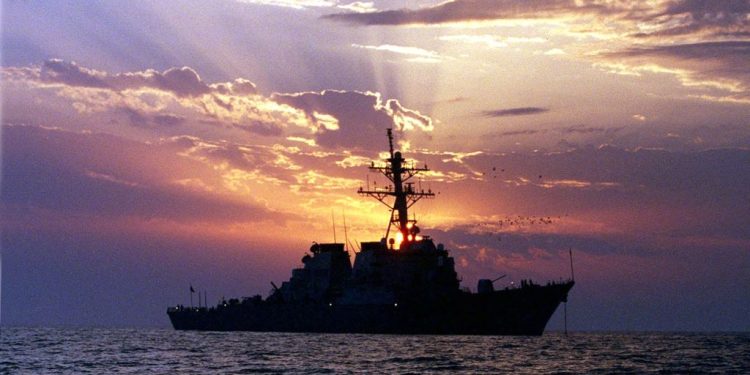While Israel gets ready for a massive ground invasion, other countries in the region are also on high alert, and from all indications, it doesn’t seem as if the war in the Middle East is going to stay contained between Israel and Hamas.
On Thursday, CNN reported that a U.S. Navy warship successfully intercepted multiple projectiles near the coast of Yemen.
According to initial reporting, approximately 2-3 missiles were launched by Houthi militants, who receive support from Iran and are embroiled in an ongoing conflict in Yemen.
Brig. Gen. Pat Ryder confirmed that the USS Carney told CNN that the drones were heading north “potentially toward targets in Israel,” although the Pentagon could not tell what exactly they were targeting.
However, on Friday, CNN produced more details on the strike, and it turned out that the attack was far more serious than initially reported.
The new report revealed that the barrage against the Arleigh-Burke class destroyer, the USS Carney, was much “more sustained” with four cruise missiles and 15 drones shot down by the warship over a period of nine hours as they were heading north along the Red Sea.
CNN reported that, according to a U.S. official, certain projectiles were flying at altitudes that posed a potential risk to commercial aviation. The USS Carney used SM-2 surface-to-air missiles to intercept both drones and missiles.
The U.S. Navy’s 5th Fleet has released several Images from aboard the Arleigh Burke-Class Destroyer, USS Carney (DDG-64) in the Red Sea, showing the Launch of RIM-66M Surface-to-Air Missiles in order to Intercept the Land-Attack Cruise Missiles that were launched earlier this… pic.twitter.com/UPumunwbiS
— OSINTdefender (@sentdefender) October 21, 2023
?: On Oct. 19, the Arleigh Burke-class guided-missile destroyer USS Carney (DDG 64) took out multiple Houthi missiles & unmanned aerial vehicles in the Red Sea ?. Carney is deployed to the @CENTCOM AOR to help ensure maritime security & stability. @SurfaceWarriors @USNavy pic.twitter.com/Kys3Ah1Z4N
— U.S. Naval Forces Central Command/U.S. 5th Fleet (@US5thFleet) October 21, 2023
Over the course of three days last week, there were multiple attacks on U.S. positions in the region.
On Wednesday, two military positions in Iraq were targeted by one-way attack drones, resulting in minor injuries during one of the attacks.
On Thursday, a garrison in Syria, which houses U.S. and coalition forces, was targeted by two drones, also causing minor injuries.
On Friday morning, two rockets were launched at the Baghdad Diplomatic Support Center near the airport, where U.S. military, diplomatic, and civilian personnel are located in Iraq — one of which was intercepted and one hit an empty building.
According to CNN, although the source of the attacks has not been disclosed by the Pentagon, these attacks are consistent with past attacks carried out by Iranian proxies against U.S. forces in the area.
Additionally, Hezbollah, another proxy of Iran, has been firing at Israel from Lebanon, prompting concerns of a second front in the war, according to The Drive.
IDF officials posted some videos on X, showing intercepted Hezbollah missiles, writing: “The IDF intercepted a target a short time ago that was on its way to the airspace of the State of Israel from the territory of Lebanon, the fear of infiltration was ruled out. Also, the IDF attacked a Hezbollah position a short time ago where a terrorist squad was operating.”
צה”ל יירט לפני זמן קצר מטרה שהייתה בדרכה למרחב האווירי של מדינת ישראל משטח לבנון, נשלל חשש לחדירה.
כמו כן, צה”ל תקף לפני זמן קצר עמדת חיזבאללה בה פעלה חוליית מחבלים. pic.twitter.com/UaWhBQWJEg
— דובר צה״ל דניאל הגרי – Daniel Hagari (@IDFSpokesperson) October 20, 2023
In the past few hours, the IDF struck targets belonging to Hezbollah, along the Lebanon border. This was in response to Wednesday’s shooting attacks. The targets struck include an observation point facing the sea, from which anti-tank missiles were fired at Rosh HaNikra. pic.twitter.com/R02l4EHG9p
— Joe Truzman (@JoeTruzman) October 19, 2023
We are at a critical juncture in the timeline of history, and the specter of escalating hostilities looms over us. While America has a duty to stand with its ally, Israel, actors such as Iran, China, North Korea, and Russia have the potential to reshape the geopolitical landscape, especially as they see the evident weakness in America’s political leadership.
As the world watches these developments unfold, it will be some time before we fully comprehend how it will all play out.
This article appeared originally on The Western Journal.


























 Continue with Google
Continue with Google